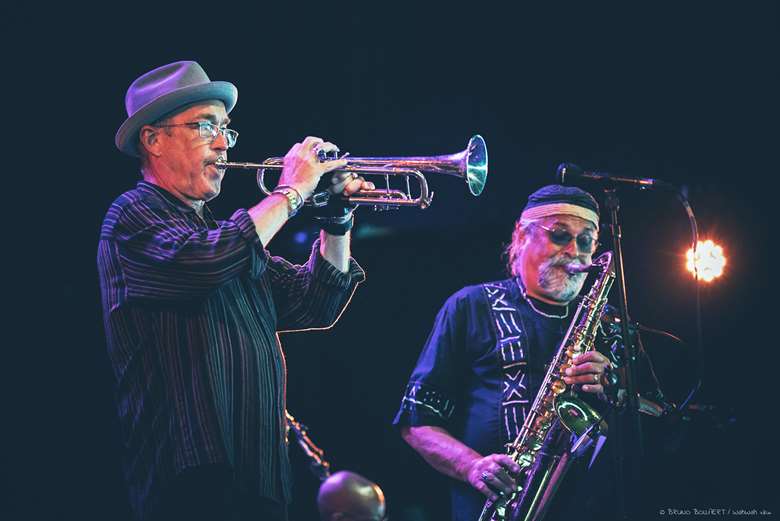Dave Douglas and Joe Lovano's Sound Prints go for it at Gent Jazz 2022
Martin Longley
Thursday, September 1, 2022
Having held off a full iteration during the past two pandemic affected years, there was a bounty of all-star jazz talent at the return of top Belgian festival

This year’s Gent Jazz nine-dayer marked a return to full international vigour, featuring several Stateside combos alongside a strong Belgian core, with a few UK acts also tackling the Channel crossing. Archie Shepp, Jason Moran, Charles Lloyd, Bill Frisell and Melody Gardot filled the rows, while Theon Cross and Maisha (with saxophonist Gary Bartz) crowded out the seatless days. Nabou Claerhout, Black Flower and Dishwasher represented Belgium in their very different ways. Gent Jazz also presented its usual degree of jazz-compatible acts, the best of these being ambient country troubadour Daniel Lanois and windswept soundscape violinist Sohnarr.
The festival’s arched tent on the Bijloke site seemed even vaster than usual, and even though the alternating sets on the nearby Garden Stage were absent this year, that bar-and-snacks area still hosted a two-day B-Jazz competition that revealed several shining outfits from other European lands.
Trumpeter Dave Douglas and saxophonist Joe Lovano leapt out of their post-2020 cages with Sound Prints, touring Europe again, and charging up their afternoon set with an unholy degree of midnight energy. Yasushi Nakamura made a deep emphasis on the basslines, with his pugilist string-tension, while Rudy Royston cracked out several winningly over-the-top solos. The horns possessed a beatnik looseness, gushing and writhing, winding and wailing together with sharp precision. Lovano stamped and shuffled across the stage, always making it clear when he’s attaining a transcendent state. Sound Prints raged with a hard discipline, working all the avenues of thought during their soloing journeys. This was an early whirlwind in a Saturday that was full of hardcore jazz.
Dishwasher devote themselves to improvisation, but in a linear, groove-centric fashion, coating their spontaneity in heady effects. Heralding their debut album, the trio tended towards shorter numbers, instead of their early preference for hour-long suites. Alto saxophone, drums and electric bass tangled up with a remarkable rapport, combining extreme sonic textures with pulsating rhythmic repetition, as Dishwasher made themselves ready for wider festival exposure in 2023.

Nabou Claerhout led her Trombone Ensemble, boasting five of those oft-neglected sliders, with the leader herself often providing expressive soloing peaks. The group made a joyous elaboration during a journeying escalation, often with a Spanish tinge to the compositions. Black Flower continue to perfect their retro-Ethiopian funk-jazz, unveiling a clutch of new tunes, with every band member crucial to the palette, equally distributed around a heady mix. Nathan Daems selected from ney flute, alto and baritone saxophones, the latter unsurprisingly carrying the heaviest weight. Trumpeter Jon Birdsong also worked through a range of conch-shell sizes, supported by skimming retro keys and fulsome basslines, the band casting heavily sinuous shapes while making stealthy gyrations. It was only De Beren Gieren who disappointed, among your scribe’s favoured Belgian outfits, this piano trio drifting inconclusively, whereas they’re usually dynamically unpredictable. They eventually struck up a stomping krautrock pulse, darkly intense, but it didn’t last long enough.
Singer, guitarist and soundscaper Daniel Lanois was joined by travelling Belgian drummer and singer Trixie Whitley, with Jim Wilson providing bass and even more bees-wing harmony vocals. They played one of the festival’s best sets, with Whitley introducing sensitive and unusual patterns, beginning by playing softly with her hands, then using the lightest reed-sticks, Lanois coating his riffs and solos with a rough, rusted ruggedness. Heartfelt country vocal tripling soared above the dub honky tonk throb, this heightened rock’n’roll reality limned by a sincere sharpness.
Sohnarr (pictured above - photo by Bruno Bollaert) was your scribe’s major Belgian discovery this year, joined by a string section, to reproduce the parts that she’d overlaid for her album. Sohnarr’s songs possess an acoustic heart, but sometimes she infiltrated some quite harsh and stripped electronic beats, singing with an arrestingly melancholic authority. Her songs qualify as the ultimate growers, hearing them live, after spinning the album.
The B-Jazz competition’s highlights included the Michelangelo Scandroglio Quintet (Italy), with some stirring alto saxophone solos, and the leader’s bass often sounding like a Moroccan gnaoua sintir, raw and fleet. This band created a jostling, community-minded polyphony.
Gent Jazz continued during the lockdown times in ‘20 and ‘21, but this year’s edition found them completely unleashed from limitations, and back on the track to their accustomed internationalism, stretching from starry names to unfamiliar debuts.
Martin Longley